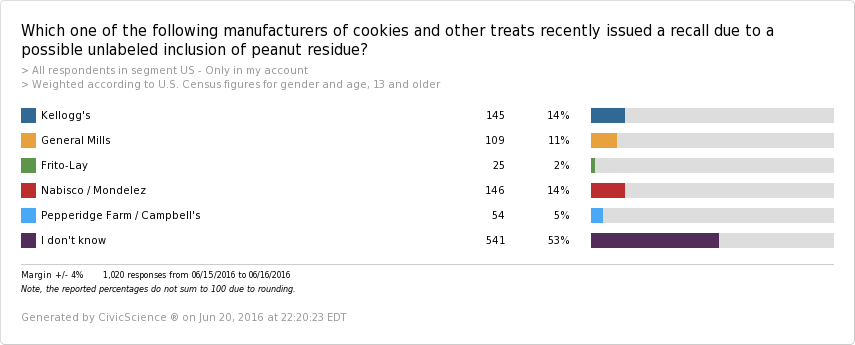In today’s informed, health-conscious culture, bad product news and contamination scares can have a severe impact on consumer food brands (See: Chipotle). Even among people unaffected by the incident, a publicized recall could foster the perception that a brand is careless or unsafe. So, last week, when Kellogg’s announced the recall of popular cookie and treat brands over the potential inclusion of unlabeled peanut residue, the company’s executives had to brace for anything.
A week later, it looks like Kellogg’s may be free and clear. Through some combination of effective PR, brand trust, and timing – there were far more important things dominating the news cycle last week – Kellogg’s is experiencing very little consumer backlash compared to similar things we’ve studied.
We started tracking the issue immediately after the news broke. Consider, for example, the results to our standard ‘Unaided Awareness’ question below:
When posed with a trivia-style question 24 hours after the recall news, only 14% of consumers correctly identified Kellogg’s as the recalling company. In fact, by one vote, more people guessed that Nabisco/Mondelez was the culprit. It’s safe to assume some portion of the Kellogg’s 14% were also merely guessing – an even smaller percentage actually knew they issued the recall. Moreover, 25% of the correct respondents said they don’t do the majority of grocery shopping for their households, which makes the potential damage even smaller.
In additional questions, where Kellogg’s was identified as the recall-er, only 6% of consumers said they might think twice before buying the company’s products in the future. Less than 1% said that they won’t buy the recalled brands again as a result.
They can breathe easy in Battle Creek, Michigan. Despite the headaches and short-term costs of such a large product recall, the long-term impact seems to be a non-issue.
(Note: One interesting thing we saw in our data was the disparity in answers to our Unaided Awareness question among people who belong to paid survey panels. These professional panelists were a full 20% more likely than non-panelists to guess Nabisco/Mondelez).









